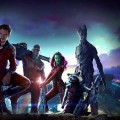In a nutshell: Even if the fate of the planet isn’t at stake, you can learn a lot about criticism, ethics and team building from the Black Panther, Captain America and Star-Lord. (Need to get up to speed on the Avengers before the new film? The Washington Post has you covered.)
Avengers, assemble! The superhero film “Avengers: Infinity War” brings together characters from nearly 20 films released over a decade. From the diminutive Ant-Man to the gigantic Hulk, these Marvel superheroes come in all sizes and shapes. And while there’s no denying the entertainment value from these kinds of films, look closer and you’ll find leadership lessons you can apply to your company and your career.
While there are no spoilers about “Avengers: Infinity War” ahead, there are some related to the films that precede it. You’ve been warned.
Black Panther: Listen to your Critics
As the leader of the fictional African nation of Wakanda, T’Challa (superhero name: Black Panther) follows in his father’s footsteps to keep his country’s technological prowess and mineral riches a secret from the rest of the world. He is challenged and defeated by a rival, named Erik Killmonger, who has a very different vision for Wakanda: He thinks the country should stop hiding and share its wealth and weaponry with oppressed people around the globe.
While Killmonger is clearly the enemy in the film, T’Challa eventually finds some value in a different worldview. By concealing itself from the world, Wakanda is eschewing its responsibility to be a force for good. By the end of the film, T’Challa introduces the real Wakanda to the international community.
Leaders can learn from T’Challa’s willingness to reevaluate his strategy for Wakanda. T’Challa disagrees with Killmonger’s goals, but he can see that Killmonger is right to want to lift the veil surrounding Wakanda. In the same way, savvy leaders will listen to their critics and find inspiration for new ideas and strategies. The critic, after all, might be introducing some good ideas that can influence the direction of the organization and help leaders reevaluate their closely held beliefs.
Captain America: Find Your Ethical North Star
In two films, “Captain America: The Winter Soldier” and “Captain America: Civil War,” Steve Rodgers (the titular Captain America) remains steadfast in his beliefs, even if it comes at a cost. In the first film, he takes action after learning of a preemptive plan to eliminate potential threats which will have a heavy human toll. In doing so, he exposes corruption at an organization that is supposed to preserve the peace.
In the second film, Rogers is again guided by his moral compass when he is faced with a plan to register superheroes and control their activities. Standing by his beliefs means creating a rift with friends and colleagues.
In leadership, it’s very important to know what you stand for in an ethical and moral sense – in effect, to have a personal North Star to guide you. As Rick Hanson writes for Psychology Today: “When you find your North Star, you know where you’re headed. That alone feels good. Plus, your North Star is (presumably) wholesome and vital, so aiming toward it will bring more and more happiness and benefit to yourself and others. And you can dream bigger dreams and take more chances in life since if you lose your way, you’ve got a beacon to home in on.”
A code of morality is essential for effective leadership. Ethical leaders will make consistent, principled decisions and inspire others to do the same.
Star-Lord: Build Diverse Organizations
At the beginning of the original “Guardians of the Galaxy,” Peter Quill (a.k.a. Star-Lord) is a roguish loner who seems more concerned with profit than people. Over the course of the film, though, he becomes the leader of a ragtag band of characters, including a green-skinned assassin, a strong-willed strongman, a genetically engineered raccoon and a talking tree. (Yes, really.) In the second film, the team grows to include an empath with antennae.
Quill’s team didn’t come together organically — they were pushed together by circumstance. And the characters don’t like each other at first. But they have complementary skill sets that allow them to achieve goals that they couldn’t accomplish on their own. They are able to hatch plans that only succeed because they all contribute something. In doing so, they are able to look beyond their individual selfishness and find a cause that benefits entire planets.
Diversity has been proven to enhance creativity, inventiveness, productivity and profitability. Smart leaders should embrace a diverse range of experiences, viewpoints and skills on their teams. Doing so increases opens infinite possibilities for the organization.
Keep the conversation going: Who is your favorite Avenger, and what has he or she taught you about leadership?






